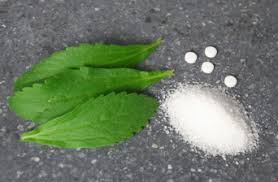Sucralose. Stevia.
No, these are not the words to some magic spell. These are just a few of the most popular artificial sweeteners that are floating around on the market. Over the years,consumers and even some scientists have come to doubt the safety of artificial sweeteners, like aspartame and sucralose, because faulty studies initially showed links to cancer.
Today I am going to give you a little run down on some of the more common sweeteners and a little of the science behind them.
 High Fructose Corn Syrup
High Fructose Corn Syrup
We associate sugar with obesity, but lab mice that ate high fructose corn syrup (this sweetener hides in everything from ketchup to yogurt) gained more weight than lab mice that ate regular sugar, even though they ate the same amount of calories.
 Sucralose (Splenda)
Sucralose (Splenda)
Food scientists make Splenda by replacing three atoms in the sugar molecules with three chlorine atoms. The body does not store the chlorine, but excretes it in the urine. The Food and Drug Administration (FDA) report that Splenda is safe for diabetics, pregnant women and children. However, some animal studies suggest that the Splenda molecules could affect the gut flora (microorganisms that naturally live in the digestive tract).
Aspartame (NutraSweet)
 Aspartame comes from the amino acids L-phenylalanine and L-aspartate, both of which the body makes. After the FDA approved NutraSweet, though, problems with the manufacturer's (Searle) safety testing program, including testing of aspartame, surfaced. This has led to considerable doubt as to the sweetener's safety. NutraSweet is the most studied artificial sweetener, and regulatory agencies' reviews, conducted decades after aspartame was first approved, still assert its safety.
Aspartame comes from the amino acids L-phenylalanine and L-aspartate, both of which the body makes. After the FDA approved NutraSweet, though, problems with the manufacturer's (Searle) safety testing program, including testing of aspartame, surfaced. This has led to considerable doubt as to the sweetener's safety. NutraSweet is the most studied artificial sweetener, and regulatory agencies' reviews, conducted decades after aspartame was first approved, still assert its safety.
 Stevia
Stevia
This is the newcomer of the sweeteners, and is not artificial. Food scientists develop an extract from the stevia plant's leaves as a sweetener. A study of more than 66,000 women over a 14-year period showed that beverages sweetened with sugar and beverages artificially sweetened both were associated with the occurrence of type 2 diabetes. The only sweetener, however, that does not seem to cause this is stevia (though the evidence is not conclusive). Two 2010 review studies found no health concerns with stevia or its sweetening extracts. We have several proteins that use Stevia as their sweetener like Met-Rx Natural Whey, MHP Paleo Protein and Nutriforce Nutriwhey.
By and large, the major claim against artificial sweeteners—that they cause cancer—has been disproven. Several studies have found higher incidences of bladder cancer in rats whose chow was pumped full of aspartame. But we're talking the human equivalent of 2,500 to 5,000 milligrams per kilogram of body weight per day—way above aspartame's ADI and more than the typical amount of aspartame an average American is thought to consume. Plus, humans don't as readily form the potentially cancer-causing calcium crystals that rats do after breaking down artificial sweeteners (and other substances). (As it turns out, overloading on vitamin C is just as likely as swallowing too much saccharin to trigger bladder cancer in our rodent friends.)
If you would like to learn more on artificial sweeteners and how you might limit the amounts your getting in your diet stop by today and speak with one of our certified nutrition coaches today!!
Till next time,
Seth
